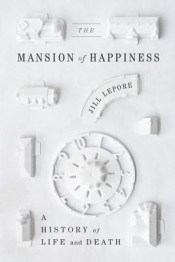Title: The Mansion of Happiness: A History of Life and Death
Author: Jill Lepore
Genre: Nonfiction
Year: 2012
Publisher: Knopf
Acquired: From the publisher for review consideration
Rating: 




Review: The questions that make up the outline of Jill Lepore’s The Mansion of Happiness are really what we might consider the Big Three Questions About Being Humans: How does life begin? What does it mean? What happens when we die? To explore these big questions and how our answers to them have changed over time, Lepore — a professor of American history at Harvard University and staff writer at the New Yorker — does what most great nonfiction writers do: narrows down the big picture through a series of very specific topics.
In this case, Lepore explores ideas of life and death and their impact on our history and our politics through ordinary (and sometimes strange) objects like Milton Bradley’s board games, sex education books for children, breast pumps and breast feeding, and the cryonics (freezing the dead) movement. Through these objects, Lepore tries to show how advances in thinking (primarily scientific) have changed very fundamentals ways about how we see the world.
I’m not sure what I was expecting when I picked up The Mansion of Happiness, but what I got wasn’t quite it. On the one hand, I loved the quirkiness of the topics Lepore chose to write about and I appreciated the clarity and depth that she wrote with. But the book also veered off in directions I didn’t expect (the chapter on breast pumps really threw me for a loop), and as I read I felt myself wishing for the book I thought I was going to read rather than the book I was actually reading; but to be honest, I’m not quite sure what that other book would have been.
In her acknowledgements — “Last Words” — Lepore notes that many of the chapters began as essays in the New Yorker, a fact that I suspected was true as I read and was glad to have confirmed. There’s a very New Yorker-y style to the entire book — intelligent, quirky, and just a little bit dry. While this is sometimes really great, particularly if you like the style of the New Yorker, it also makes the book feel a little disjointed; it can be hard to see how the topics relate to one another outside of Lepore’s decision to put them together in a single book.
At the same time, it’s hard to fault a book for it being different than what I was expecting. Lepore executes, nearly perfectly, what she was actually trying to do — each chapter, alone, was fascinating. But they felt more like chapters from several different books rather than a single cohesive unit. Perhaps if I’d read the jacket copy more carefully, I’d have had a better idea of what to expect and I’d have reacted differently. In this case, The Mansion of Happiness was well written and full of great details, it just wasn’t quite what I had in mind when I picked it up.
Other Reviews:
If you have reviewed this book, please leave a link to the review in the comments and I will add your review to the main post. All I ask is for you to do the same to mine — thanks!


Comments on this entry are closed.
If I had read this, I probably wouldn’t know what to expect either. It sounds like such a quirky read but pretty interesting.
Maybe if I read the book as distinct chapters it would work? I do like the strange topics.
I think that is a good approach. There are some connections between them — mostly references to help set timelines and how events are related to each other — but it may make more sense to just think of it as a series of New Yorker articles.
I was just as confused when I read “breast pumps” in your synopsis. I generally enjoy these scientific looks at the basic questions of life and so may check out Lepore’s book. Will keep in mind the disjointed topics and take as essays that I can pick and choose to read per Trisha’s comment.
Besides that, the cover art for this book is gorgeous enough for me to just put up on my bookshelf as art.
I do love the cover. I didn’t get the Game of Life thing until after I finished reading the book, but I must not have looked at it closely the first time!
There was a piece on nPR about this book, and it sounded really interesting. But I think that was just because they focused on the board games. 😀
I loved the board game chapter. I think it was first, and it was really neat to think about how board game evolve to reflect the values and moods of the time they are created in.
It sounds more like a loosely related collection of essays than a book per se. Maybe that’s why it didn’t completely work for you? It does sound quite interesting, though.
Yes — I think if I’d been thinking about the book that way, I might have expected something more like what I ended up reading. As essays, I think this works great, it’s just not as well-connected as I think the jacket/marking suggest.